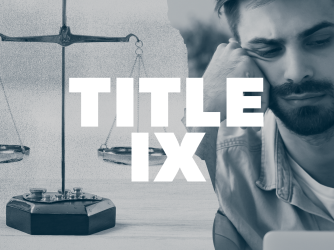Table of Contents
Hans Bader Deconstructs Widener's 'Retaliation' Argument
Over at Minding the Campus, Hans Bader exposes the flimsy legal underpinnings of Widener University's finding this past July that Professor Lawrence Connell was guilty of "retaliation" for defending himself against baseless charges of racial discrimination.
We've covered Connell's ordeal extensively here on The Torch, but in case you've forgotten the shocking details, here's Bader's useful summation of the case:
Connell was convicted of "retaliation" because he and his lawyer denounced meritless racial harassment charges against him over his classroom teaching .... Connell, who is white, was charged with racial harassment and removed from Widener's campus because he discussed hypothetical crimes in his criminal law class, including the imaginary killing of the law school dean, Linda Ammons, who happens to be black. (He was also accused of harassment because he "expressed his philosophical concerns about the fairness and utility of hate crime" laws).
But there was never any evidence that Connell used the dean in these hypotheticals because of her race. (Comments are not "racial harassment" unless they target a victim based on her race, and are severe and pervasive, according to Caver v. City of Trenton, a ruling by the appeals court that has jurisdiction over Widener.) Far from being a racist, Connell had spent 15 years successfully working to save the life of a black man who had been sentenced to die after he was convicted of murder by an all-white jury.
[...]
After Connell was exonerated by a committee of law professors, the charges against him were resubmitted to a disciplinary panel including Dean Ammons herself, another Widener administrator, and a professor hand-picked by Ammons.
While even this panel was forced to concede that Connell had not committed racial harassment, it found him guilty of two acts of "retaliation": the first was an email protesting his innocence after he was suspended and banned from campus, and the second was his lawyer's public statement that he was preparing to sue over the unfounded allegations.
Having set forth the facts, Bader—a former staff attorney for the Department of Education's Office for Civil Rights—proceeds to destroy Widener's justification for its finding:
Connell's email did not constitute "retaliation" under controlling legal authority. But Widener was able to claim otherwise with a straight face, by cherry-picking language from court rulings it selectively cited. First, it recited the vague, broad definition of retaliation from the Supreme Court's decision in Burlington Northern v. White (2006): conduct that "could well dissuade a reasonable worker from making or supporting a charge of discrimination." The email, it suggested, could dissuade complaints by making complainants uncomfortable or inciting ostracism against them.
But Widener ignored language in that court ruling saying that mild expressions of hostility in response to a complaint do not rise to the level of "retaliation." The Supreme Court declared that "snubbing by supervisors or co-workers" or "petty slights" in response to a complaint do not rise to the level of retaliation, since they would not be "material" enough to dissuade a "reasonable" person from complaining. If actual snubbing is not retaliation, Connell's email can't qualify based on Widener's speculation that it could lead to snubbing. The Supreme Court also said that only "significant" rather than "trivial harms" constitute retaliation, and that "sporadic" "abusive language" or "occasional teasing" does not qualify.
Second, Widener cited a ruling from a Midwestern appeals court (which has no jurisdiction over Widener), that rejected a challenge to a professor's discipline for publicly criticizing a harassment complaint. That disturbing ruling, Bonnell v. Lorenzo, essentially held that bans on "retaliation" trump the First Amendment, menacing academic freedom.
In doing so, Widener ignored other First Amendment rulings limiting the reach of retaliation law. For example, in BE&K Construction Co. v. NLRB (2002), the Supreme Court held that an employer's reasonable, but unsuccessful, lawsuit was protected by the First Amendment's petition clause even if it had a "retaliatory motive." In Bain v. City of Springfield (1997), the Massachusetts Supreme Court ruled that a mayor was entitled to publicly denounce a sexual harassment complaint against him, even if that could dissuade the filing of harassment charges, since retaliation prohibitions are limited by "constitutional guarantees of freedom of speech. The interest in remedying discrimination is weighty but not so weighty as to justify what amounts to a restriction on core political speech." Similarly, in Brooks v. City of San Mateo (2000), the Ninth Circuit held that "retaliation" could not be found based on "mere ostracism" or employees' refusal to associate with an employee after she brought an unsuccessful harassment complaint, citing a potential clash with the "First Amendment freedom of association."
Bader's full legal analysis is well worth reading.
Recent Articles
FIRE’s award-winning Newsdesk covers the free speech news you need to stay informed.


FIRE statement on campus violence and arrests

BREAKING: New Title IX regulations undermine campus free speech and due process rights
